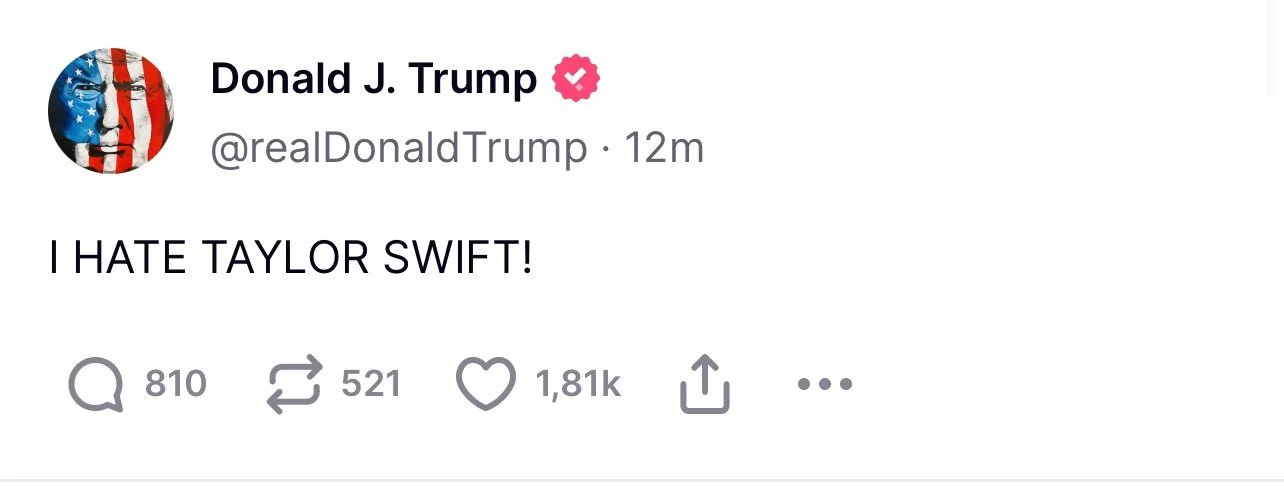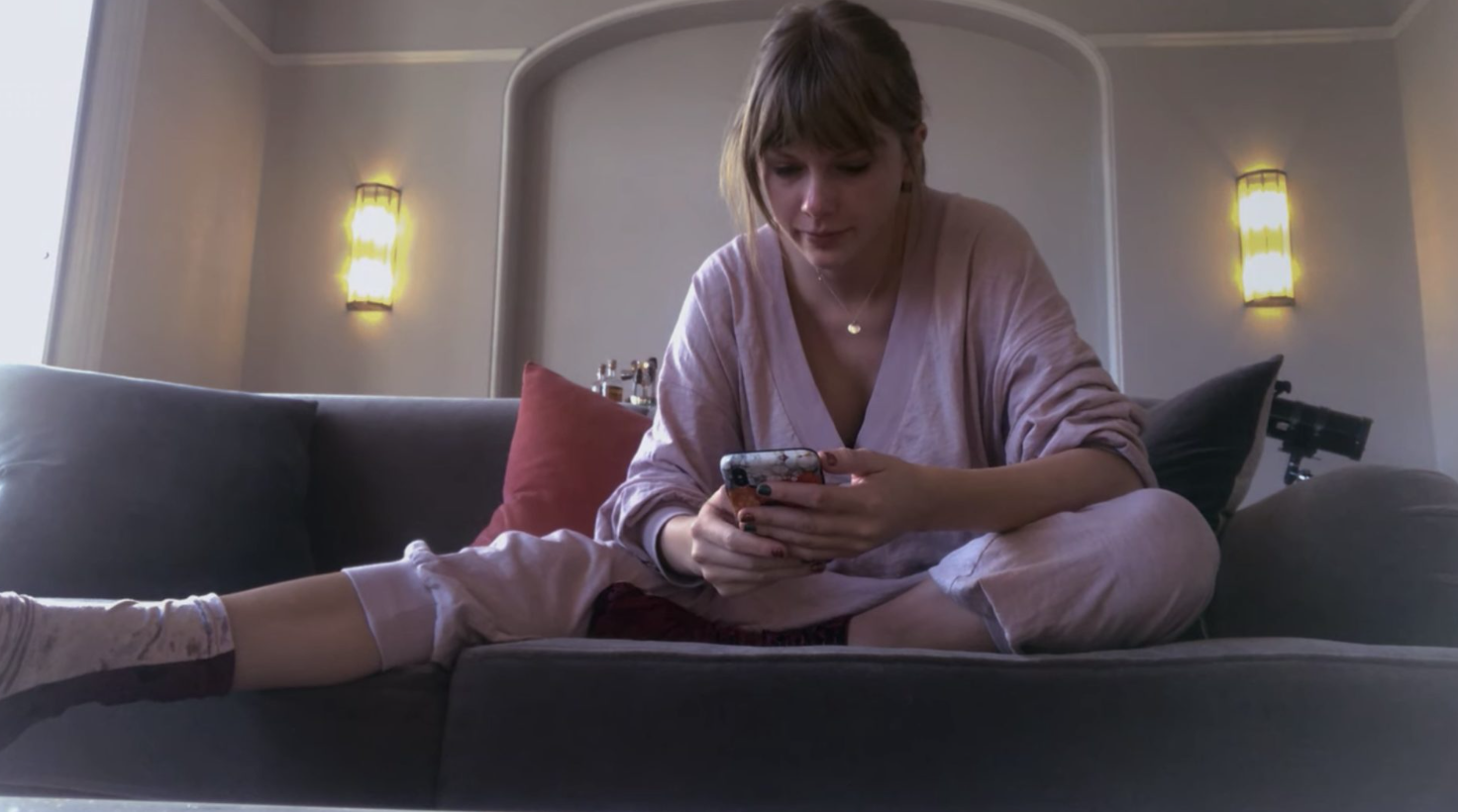We Need To Talk About Taylor Swift's Activism
In the words of my favorite Taylor Swift TikTok creator, Dr. Bryanlicious2: “Is there a storm a-brewin’ with Taylor Swift?” Oh, absolutely. It’s time we talk about Taylor Swift’s activism—or more accurately, the vacuum where it used to be.
I’m a Swiftie and have been for nearly two decades. So, as someone with her lyrics tattooed on my skin and curated playlists of acoustic surprise songs for every emotional emergency, I’ve long believed in Taylor. Not just as a performer, but as a symbol. A mirror for girlhood. A blueprint for reinvention. A voice that felt like it was growing with us.
When her documentary, Miss Americana, dropped in 2020, it felt like a turning point. A political awakening from a woman who could actually move the cultural needle with a single Instagram caption. But now? That promise feels broken.
The Taylor who swore she’d be on the right side of history has gone quiet. And the silence? It’s not just disappointing, it’s as thunderously loud as the sound of 76,000 fans screaming the bridge to “Cruel Summer” on the Eras Tour.
The Miss Americana Mirage
Miss Americana wasn’t just a PR move. It was a promise dedicated to taking a different path. Swift opened up about her regret for staying silent during the 2016 election, her conflict with her team and father over going political, and her decision to speak out against Tennessee Senator Marsha Blackburn.
We saw tears, conviction, and courage. “I need to be on the right side of history,” she declared. “If I get bad press for saying don’t put a homophobic racist in office, then I get bad press.”
It was powerful. She was powerful. And she was ready to use that power to mobilize young voters, to speak out about double standards, to be a glitter-wearing political force.
It felt like something shifted, not just in her, but in all of us who wanted to believe that a pop star could care enough to take real risks.
From Rainbow Flags to Radio Silence
Now, in one of the most politically fraught moments of our lives, Swift's activism has all but vanished. Her endorsement of Kamala Harris came only after the debate with Trump—strategic timing, sure, but hardly the bold leadership we once expected from her.
And what else have we gotten from her this year? A note about reclaiming her masters and merch drops. Backpacks. Pajamas. A Fearless cardigan. A Speak Now anniversary collection for an album she barely included in the Eras Tour setlist. All this while democracy hangs in the balance? Be so fucking for real, Taylor Alison Swift.
This silence cuts deeper when you remember the 2019 Lover era and the "You Need To Calm Down” music video, it was a time of rainbow-drenched advocacy for LGBTQ+ rights, a call-to-action petition with over 500,000 signatures, and a direct callout to Trump from the MTV VMA stage. That Taylor felt bold, intentional, activated.
But this past Pride Month? Nothing. Not a single post. Not even an Instagram story. Just silence while the current administration refuses even to acknowledge Pride. The contrast is stark, and in her own words from the song “The Story of Us,” “I’ve never heard silence quite this loud.”
The Travis Factor
As much as it pains me to admit this (and I struggle with my own internalized misogyny in even thinking it), I can't help but wonder if Swift's political silence is connected to her relationship with Travis Kelce.
It feels regressive to suggest that a woman would mute herself for a man. But the timeline is suspicious. Swift’s political silence has coincided with her most public relationship yet—with a football star in a hyper-conservative league, cheered on by a fanbase that might not be thrilled with rainbow stage lights, voter registration booths, or women having their bodily autonomy.
Is Swift molding herself to fit him? Based on her lyrics across the body of her work, signs point to this. Just listen to “Chloe Or Sam or Sophia or Marcus” from The Tortured Poets Department anthology when she sings: "I changed into goddesses, villains and fools / Changed plans and lovers and outfits and rules.” Or the entirety of folklore’s “mirrorball,” where she sings that she’ll show you every version of yourself tonight.
Whether the Travis Kelce of it all plays into this or not, this doesn’t align with the Miss Americana Swift that said: “I wanna love glitter and also stand up for the double standards that exist in our society.”
Glitter? She's still got plenty. The standards? They've been buried under merch drops, delayed social posts, and pap walks with the man she cheekily wrote the line, "You know how to ball/I know Aristotle,” about.
The Company She Keeps
While Swift has given Swifties nothing this year in terms of political leadership, she's given the internet a steady stream of photo ops with MAGA-friendly figures.
She's been seen cozying up with Brittany Mahomes, Wayne Gretzky, and the Bussin' With the Boys crew—guys whose brand is bro culture with a side of casual misogyny. The irony is rich: this is the same woman who once sang, "In your life you'll do things greater than dating the boy on the football team." Now she's literally dating the boy on the football team, and it seems like nothing else matters.
Rubbing shoulders with MAGA and MAGA-adjacent people is made infinitely worse by the fact that Donald Trump has made Taylor Swift a recurring political talking point. Remember, he raged on Truth Social, saying, "I HATE TAYLOR SWIFT!" So why, exactly, is she still standing next to men who likely voted for him?
The photo with the Bussin' With the Boys crew that recently dropped was particularly egregious to me. Host Taylor Lewan has a troubling past, including allegations of threatening to "rape" a woman who accused his teammate of assault. He denied it, but the shadow remains. Add in his 2013 assault charges, and it's hard to reconcile his presence beside a woman who once testified in court against her own assaulter (and won).
But the image itself—Swift flexing alongside these men—felt like the most damning part. Here was a woman who built her career on critiquing male dominance, literally performing it. The visual contradiction of everything she once claimed to stand for wasn't just tone-deaf, it was stomach-turning.
From Courage to Calculation
I keep thinking about the Swift we saw in Miss Americana, writing, “Only The Young.” A song about school shootings and political frustration that felt like it was ripped from her chest. It was raw, urgent, and unflinchingly brave.
"You did all that you could do / The game was rigged, the ref got tricked/The wrong ones think they're right/You were outnumbered, this time.” Those weren't just lyrics, they were a battle cry for a generation watching democracy crumble in real time. She understood that young people were dying in classrooms, that the system was failing them, that someone with her platform had to speak. She even goes on in the song to reference: “The big bad man and his big bad clan/Their hands are stained with red” and drills down to say: “They aren’t gonna help us/Too busy heping themselves/They aren’t gonna change this/We gotta do it ourselves.”
Now? That artist has vanished precisely when the stakes couldn't be higher. She's no longer the person who wanted to "shift the power by being bold enough." Instead, her political voice has become a focus-grouped whisper that emerges only when the market research gives the all-clear.
I keep hearing her old quote in my head: "A man does something, it's strategic. A woman does it, it's calculated." I hate falling into this gender trap, but watching her stay silent while democracy burns feels like the most calculated move of all.
To the Swifties ready to come for my neck: I'm asking you to look at the pattern. When reproductive rights were being stripped away state by state—silence. When trans kids were being targeted with legislation designed to erase them—silence. When ICE was ramping up family separations—silence. When Pride Month came and went without acknowledgment—silence. But a Speak Now anniversary backpack? That gets the full rollout.
If we're not calling this deliberate pattern of safe, sanitized, brand-protective engagement calculated, then we've lost the plot entirely. This isn't strategy, it's moral cowardice dressed up in market research.
The Billionaire's Balancing Act
Let me be clear: I don't think Taylor is MAGA. But Taylor Swift, the brand? It's giving corporate Switzerland. It's giving "let's not alienate the buyers who might stream less if we get too political." Which is tragic, because brands that lose trust don't just stumble—they collapse.
The numbers don't lie: 88% of consumers say trust is crucial when deciding what to buy. 45% say once it's broken, it's gone for good. Swift's inconsistent political messaging doesn't just feel hollow—it's actively eroding her brand among the very fans who once believed she stood for something beyond profit margins.
You can't be a "Miss Americana" and a silent billionaire in the same breath. You can't cry about being on the right side of history in a Netflix documentary and then disappear when history is actually being written. The cognitive dissonance is deafening.
Other artists have cracked this code. Beyoncé built an empire while never wavering on Black liberation. Dolly Parton has been a progressive icon for decades without losing her conservative fanbase. Hell, even Harry Styles managed to be unapologetically political while selling out stadiums worldwide. You can be wildly successful and politically consistent—you just have to actually mean it.
But Swift has chosen the path of maximum profit over maximum impact. She's discovered that being a billionaire is easier when you stop caring about being a leader. The math is simple: silence sells. Courage, apparently, doesn't.
When Feminism Fits Your Brand
Swift’s selective political engagement often centers around issues that align with her personal brand or lived experience, while leaving intersectional feminism out of the frame. The result? A version of activism that feels more like curated branding than collective liberation.
She’s spoken out about being slut-shamed and underestimated, but not about the racial pay gap or maternal mortality crisis. Black women are 3–4 times more likely to die from pregnancy complications than white women. Latina women earn 55 cents to every white man’s dollar. Women of color are grossly underrepresented in Congress. These aren’t niche concerns, they’re foundational feminist issues.
I keep thinking about the song “Daylight” from Lover, where the outro ends with a voice memo:
“I wanna be defined by the things that I love, not the things that I hate, not the things that I’m afraid of... I just think that… you are what you love.”
It hit different in 2019. But now…if she is what she loves… then what is that exactly? Money? It’s starting to feel like she doesn’t love justice. She loves the illusion of standing for something, but just not enough to risk the brand.
What Happened to “I Need to Do This, Dad?”
In Miss Americana, Swift tells her business-driven father, Scott Swift, “I need to do this,” referring to her decision to speak out politically.
He warns her that speaking up could compromise her safety. He’s not wrong, public political stances do carry risk. But here's the thing: Taylor Swift isn’t just any public figure. She’s a billionaire. The resources are there. She has the kind of security most political activists could only dream of. Private jets. Gated estates. Personal bodyguards. Digital threat monitoring teams. Plus, publicist extraordinaire, Tree Paine.
She can afford to speak out, and she said she would. She chose to take that risk before. So why pull back now?
In my opinion, if Swift really wanted to be on the right side of history, she’d be here. Loudly. Consistently. Not only when it’s convenient. Not only when the merch drop is scheduled to push a $75 Speak Now anniversary backpack, not a single soul asked for.
It’s So Exhausting Always Rooting for the Anti-Hero
I don’t hate Taylor Swift. I love her. And that’s why this feels like a betrayal.
I believed her when she looked into the camera in Miss Americana and promised she’d be on the right side of history. I defended her through the snake emojis, the media smear campaigns, the reputation blackout. I stood by her when the world turned against her. And I waited, truly waited, for her voice when it mattered most.
But now, I’m watching her disappear. While women lose autonomy. While trans kids are targeted. While ICE tears families apart. While millions are losing healthcare.
She avoids controversy. She sidesteps accountability. She says whatever keeps the streams high and the tour seats filled. To me, that’s not bold, that’s not brave, that’s not leadership—it’s Reaganomics in a sequined bodysuit.
I find it kind of funny that Miss Americana is still streaming on Netflix. It’s still up, presenting a version of Taylor Swift that no longer exists. The one who cried over Marsha Blackburn, who said “I need to do this,” who dared her team to “forgive me for doing it.” That Taylor gave us hope. This Taylor gives us…backpacks and her first performance since the Eras Tour and reclaiming her masters at a Tight End University performance.
I don’t think she owes us an album of protest songs. I don’t think she needs to turn her Instagram into a war room or give us anything more. She gave so much of herself for nearly two years on the Eras Tour. I’m not asking for more. But I do think we’re allowed to ask why the woman who made political bravery a public pillar of her brand is now nowhere to be found when that bravery is needed most.
I want her to rise. I want to believe she’ll remember who she said she was. But I don’t expect her to anymore. And maybe that’s the part that hurts the most. Not that she’s imperfect. Not that she changed. But that she swore she wouldn’t—and then did it anyway and when we needed her most.
Swift remains right about one thing though: it is exhausting always rooting for the anti-hero. Especially when the hero she promised to be never showed up for the fight.









